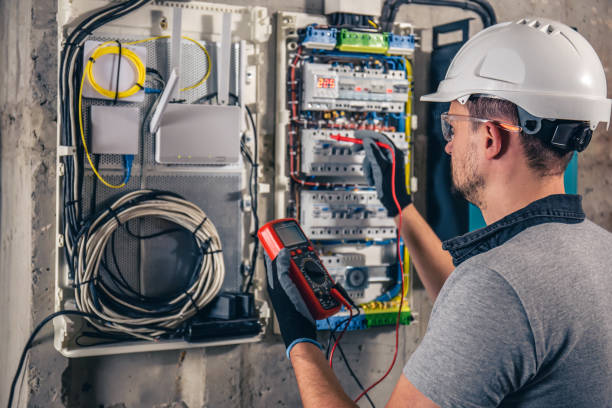Electric Panel Repair & Electrical Wiring Insulation: A Homeowner’s Complete Guide
Maintaining a safe and efficient electrical system is essential for every homeowner. Two of the most important but often overlooked aspects are electric panel repair and electrical wiring insulation. These systems work together to power your home safely, and when neglected, they can become serious fire or safety hazards.
In this guide, you’ll learn why they matter, how to spot signs of trouble, and when to call in the professionals.
What Is an Electric Panel and Why Is It Important?
An electric panel, also known as a breaker box or service panel, is the heart of your home’s electrical system. It controls the flow of electricity from the main power line into the circuits throughout your house.
If your panel is old, damaged, or undersized, it can’t handle the power demands of modern appliances and devices. This can lead to frequent power interruptions, overheating, and increased fire risks.
Signs You Need Electric Panel Repair
Recognizing early warning signs of panel failure is key to avoiding major electrical problems. If you experience any of the following issues, it may be time for professional electric panel repair:
Frequent Breaker Trips
If your breakers trip often, your panel may be overloaded or malfunctioning.
Flickering or Dimming Lights
Lights that flicker when using appliances could mean the panel isn’t distributing power correctly.
Burn Marks or Rust
Visible corrosion or scorching near the panel indicates overheating or water exposure.
Strange Smells or Sounds
Burning odors, buzzing, or crackling sounds near the panel are serious red flags and require immediate inspection.
Heat Emanating from the Panel
Panels should not feel hot. If they do, this is a sign of overheating components inside.
What Is Electrical Wiring Insulation?
Electrical wiring insulation is the protective layer that surrounds electrical wires, designed to prevent accidental contact, heat buildup, and electrical fires. It is a vital safety feature that keeps electricity flowing efficiently and securely through your home.
Modern wiring insulation is typically made from thermoplastic or rubber-like materials, designed to withstand heat, moisture, and chemical exposure.
Why Electrical Wiring Insulation Matters
Old or damaged insulation can expose live wires, leading to dangerous conditions. Proper insulation serves several important functions:
Fire Prevention
Well-insulated wires reduce the risk of overheating and short circuits, which are common causes of house fires.
Shock Protection
Insulation prevents accidental contact with live wires, protecting you and your family from electric shocks.
Energy Efficiency
Insulated wires transmit electricity more efficiently, reducing energy loss and supporting the performance of your electrical system.
Signs of Faulty Wiring Insulation
Knowing what to look for can help prevent problems before they escalate. Signs that your wiring insulation may need attention include:
Crackling or Buzzing in Walls
Unusual sounds inside your walls often indicate damaged wires or loose connections.
Discolored Outlets or Switches
Burn marks or discoloration around outlets may point to overheating caused by failing insulation.
Tingling Sensation When Touching Devices
If appliances give you a mild shock, the wiring may be exposed or improperly grounded.
Frequent Power Fluctuations
Sudden loss of power or appliance malfunctions may be caused by faulty wires and degraded insulation.
How Electric Panel Repair and Wiring Insulation Work Together
Both your electric panel and your wiring system must work in harmony for your home to be safe and efficient. If one component fails, it puts strain on the other.
An outdated or faulty panel can overload circuits, overheating wires and compromising their insulation. Likewise, damaged insulation can lead to arcing or short circuits, which frequently trip the breakers in your panel.
That’s why electricians often inspect both the panel and the wiring insulation during upgrades or repairs.
Why You Should Hire a Licensed Electrician
While some homeowners are tempted to perform their own repairs, working with electrical systems is not safe without the proper knowledge and tools. A licensed electrician ensures that all work is done according to code, reducing liability and maximizing safety.
Professional electricians provide:
- Accurate diagnostics of panel and wiring issues
- Proper replacement of outdated components
- Full code compliance for insurance and safety inspections
- Safe installation practices that protect your home and family
Cost of Electric Panel Repair and Wiring Insulation
Costs vary depending on the condition of your system, the size of your home, and local labor rates.
- Electric panel repair typically costs between $300 and $1,500, depending on the complexity.
- Electrical wiring insulation replacement ranges from $2 to $5 per linear foot.
Although these upgrades may seem costly, they are essential for protecting your property and reducing long-term energy bills and risks.
Final Thoughts: Don’t Delay Essential Electrical Maintenance
Your home’s electrical system is more than just wires and switches—it’s a complex network that needs regular care. Electric panel repair and electrical wiring insulation play a critical role in ensuring your home remains safe, efficient, and up to code.
Don’t wait for a major issue to take action. Schedule a professional inspection and invest in quality repairs to protect your family and your property.
Frequently Asked Questions (FAQs)
1. How often should an electric panel be checked?
Every 3 to 5 years, or immediately if there are signs of malfunction such as frequent breaker trips or unusual sounds.
2. What type of insulation is used for modern electrical wiring?
Most modern homes use THHN (Thermoplastic High Heat-resistant Nylon-coated) wiring, which is durable and code-compliant.
3. Can I repair my electric panel or wiring insulation myself?
It’s not recommended. Only licensed electricians should handle panel and wiring repairs due to the risk of shock or fire.
4. What are the dangers of damaged wiring insulation?
Exposed or degraded insulation can cause shocks, short circuits, or fires—especially in older homes with outdated systems.
5. How do I know if my electrical panel needs an upgrade?
If your panel is over 25 years old, frequently trips, or can’t handle modern electrical loads, it’s time for an upgrade.

